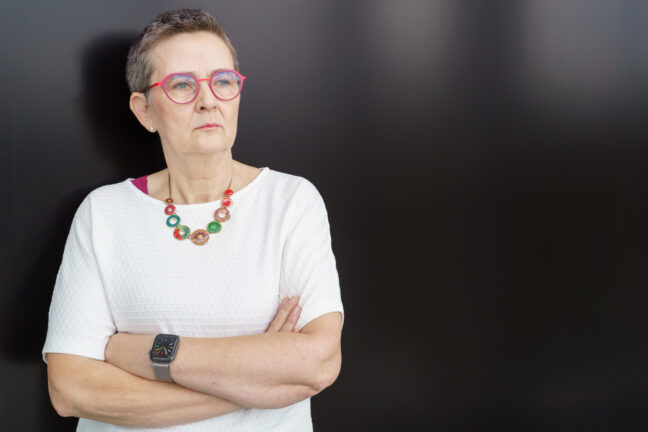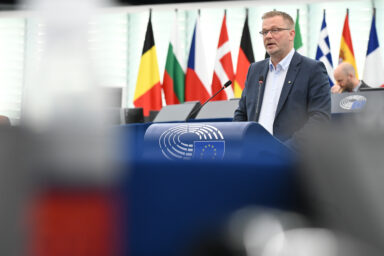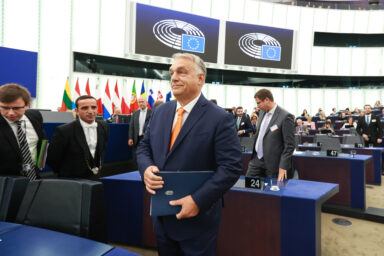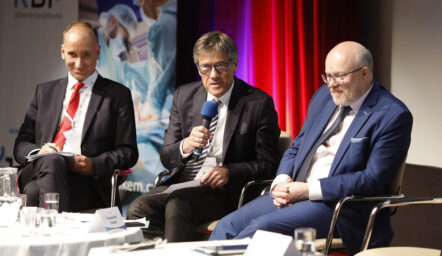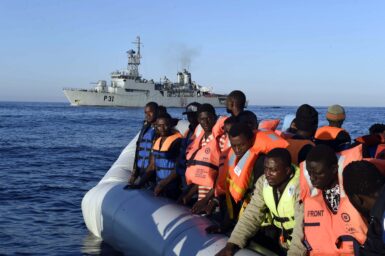The swelling number of migrants entering the European Union gives security aspects of the issue growing prominence. This creates sharp political divides among countries, parties, and individuals. German Socialist MEP Birgit Sippel, spoke to EU Perspectives about bridging such divides while staying true to both legal and political principles of the Union.
The file dealing with the problem, bearing the title “Laying down minimum rules to prevent and counter the facilitation of unauthorised entry, transit and stay in the Union”, is now subject to scrutiny by the European Parliament’s Committee for Civil Liberties, Justice and Home Affairs (LIBE). MEP Birgit Sippel (S&D/DE), rapporteur for the file, told EU Perspectives about the difficulties in finding compromises among political groups and LIBE Committee members. Ms Sippel’s goal is to ensure that humanitarian actions are not criminalised. “But of course, there are criminal gangs who are in the game,” she admits.
While the current facilitation directive gives member states the possibility not to impose sanctions, humanitarian assistance is still often criminalised, Ms Sippel says. This has led to unfounded accusations in some member states against the work of NGOs and in some cases to them even being threatened with sanctions.
No broad consensus yet
During the previous parliamentary term, the European Parliament therefore requested a new proposal from the Commission aimed at clarifying that, when referring to facilitation—that is, making it easier for people to enter the European Union—humanitarian actions should not be subject to criminal sanctions. With the Commission’s proposal now on the table, reactions among political groups have been divergent from the outset: some welcomed the initiative, while others expressed reservations.
How is the state of play for the file?
In the Council’s position, it’s not clear in our view that humanitarian actions will not be criminalized. So, of course, we started negotiations. We have not yet finished — we are still on our way in Parliament. But clearly, the question of humanitarian assistance is a key issue in the whole debate. The other question, of course, is the definition of crime. And here we try to make use—you mentioned it to some extent—of international definitions of crime in that area. That was a bit helpful. But humanitarian action is still an issue.
You might be interested
Is this the main focus of the legislation?
There are also other things that might not be that important but still play a role. What kinds of crimes we are willing to pursue in the context of this legislative piece, how high the sanctions should be, and there was also a part about special investigative tools. In many member states we have certain rules about what kinds of tools investigators can use for petty crimes as opposed to serious crimes. And there are debates about what kind of tools we can use in the context of facilitation. But the main point, clearly, is the question of humanitarian action. That’s why we are still on our way, trying to find a compromise — but we are not there yet.
Regarding the investigation tools, how do they work?
It does not relate to any specific agency or organization. But if authorities fight criminals in the context of irregular migration, the question is: what tools may they use? For example, can they use special investigation tools — or can they access communications, to follow chats or things like that? These are tools normally used for very serious organized crime. The question is whether they can be used at any time. That is, even when organized crime is not involved, only petty crime. I mentioned it as part of the debate. In the end, I think that’s not the most important part. Different groups have different views on this, but it’s not the main question on which debates are still ongoing.
What will be the compromise to reach on one side guarantees and the vote inside LIBE? Are there any concerns?
So far we haven’t found a solution yet on that because the views are totally different. And if you look at the text of the Council, for example, they mention humanitarian assistance only in a recital. Some groups in the house might support it. Others believe that if you only mention it in a recital, it will not have the effect. It will not force member states to change their behavior.
We already see that some member states criminalize NGOs and humanitarian assistance. They accuse them, they detain them. So far, I don’t see that they have any clear evidence that these people are criminals. But the idea, obviously, is to make humanitarian assistance nearly impossible. It means discouraging people from helping others, bringing them to court, imposing high fines, or even threatening them with detention. We want to ensure that pure humanitarian activity is not criminalized. And here we are fighting together to find wording strong enough to ensure this. That’s the very point we are still discussing.
So after the discussion is finished in Parliament, how could a compromise be reached among member states?
I think the problem is that we are talking about a legislative file, so we should find a legal answer. I’m not sure that everyone is interested in a legal answer — perhaps more in a political signal or symbol. The argument from some member states is that if we say humanitarian action is not a crime, they will not have the chance to act in case someone working for an NGO commits a crime.
That’s ridiculous. In Germany, for instance, we have organizations with a very positive image, like firefighters. No one is against firefighters. Nevertheless, it happens every now and then that one person working in that organization commits a crime. Of course, you can go against that person. That doesn’t mean you should say the whole organization is criminal or that everyone working there is.
Is this a political, rather than legal debate?
To some extent, it’s a political debate. Some want to send a signal that NGOs are criminal; they may not want asylum seekers at their borders. On the legal side, however, there is an international obligation to allow people who are fleeing and in need of protection to enter and receive assistance. If we were to say that humanitarian activity can always be a crime, we would undermine the work of NGOs and might end up with no one helping people. I understand, of course, that not all people arriving at our borders are asylum seekers in need of protection. That’s true.
But the fact that some are not in need of international protection does not make them criminals. The vast majority are simply looking for better prospects, for a better life, for a job. They shouldn’t apply for asylum — there should be other legal ways for them. The sad story is that for people from third countries looking for a job in the EU, we make it very difficult. I’m from Germany, and the procedures to get a residence and work permit are complex and take very long. Every country has its own system. So if people are simply looking for a job, and we do need workers at all levels, we should find better, harmonized solutions to facilitate this. Not everyone arriving is an asylum seeker, but that doesn’t mean we can simply push back or prevent everyone from coming to the EU. There is no silver bullet.
What is the main point of the facilitation legislation?
With the facilitation legislation, we only need to make a clear distinction between what is a crime and what is humanitarian activity. For differentiating between those in need of protection and others, we need different legal instruments — files on legal migration, resettlement for asylum seekers, and of course measures against organized crime. Facilitation should only focus on distinguishing between criminal acts and humanitarian assistance. The political problem is that some actors believe they can solve everything with just one file — which is not the case.
Why do some political groups still obstruct this?
To be honest, I believe this is pure political ideology. We know we need people at all different levels in the workforce. On one hand, some people complain about too many arrivals, and at the same time, we exploit those who arrive irregularly, making them work in certain sectors for very low wages, without social security, sometimes seven days a week. We abuse them. So, you could say we are happy they are here because we use them, but at the same time we complain about them.
How does this behaviour impact the debate?
This behaviour makes some citizens believe that migrants working for very low wages destroy our job market — but that’s not the migrants’ fault, it’s the companies’. Being in need of migration, yet creating the impression that migration is awful and migrants are criminals, is pure ideology. And from what I know of Germany, our industry says that every year we need around 300,000 to 500,000 workers — at all levels: IT experts, carers, farm workers, transport workers. We need them at every level. Therefore, it’s ridiculous to say we are against any kind of migration — yet that is the basis of many of the debates we have on migration and asylum.
Could this narrative convince other political groups to compromise and reframe how third-country nationals could apply for jobs in the EU? Could that be a way to at least open the process?
Sometimes I believe it might be easier to speak directly to citizens who are concerned about what’s going on. We have to understand—and citizens hopefully will too—that someone who is a refugee or asylum seeker doesn’t want to remain one for the next 20 years. They need protection, yes, but they also want to restart their lives, to work. It’s not that they want to live on public support forever. And we always complain about those who are unskilled, but at least in Germany, many highly qualified people—doctors, carers—have arrived as asylum seekers or refugees. We need to recognize that.
What sort of measures would be helpful to enact?
If the question is that we need to know who is coming, then yes, let’s decide that — but let’s not fight the people themselves. Let’s decide: those in need of protection can enter and integrate into our society. And beyond that, if we need migration for employment, let’s make the procedure as easy as possible. If it were easy for a third-country national to say, “I would like to work; here are my skills; here’s what I could do with proper training,” and then get an entry visa to seek a job — why would they turn to criminal smugglers and pay huge sums?
If we organize this better, we can create a win-win situation — for migrants, asylum seekers, and our own societies. Once we focus on what benefits everyone, we can find solutions. But if we only create fear, we will divide our societies, lose trust, and end up in a world none of us wants to live in.
How do you manage to still have an impact – given how powerful the security narrative is?
It’s very impactful. We had an event here in the Parliament to celebrate 40 years of Schengen. It is a reason to celebrate, if we protect it instead of restarting internal border controls. But I wasn’t really shocked, because I knew beforehand that some colleagues from conservative parties would use the opportunity to say: “Yes, Schengen is great, but to keep our freedoms we need control, surveillance, more security measures.” So instead of celebrating the positives, we create fear. And no amount of surveillance will help.
It’s frustrating sometimes, but we have to find ways to deal with frustration. We cannot give up fighting the idea behind creating the Union and the Schengen area. It’s a space of freedom and safety. Everyone who wants change must work for it. We need to keep all democratic forces together, not only in Parliament but also outside. We must cooperate with those who want to defend democracy and European values. Together we can create pressure to strengthen, not weaken, these principles. You see, we are now far from facilitation or any specific file. But I agree — the general political climate plays a fundamental role in how debates happen here. That’s why our discussion has moved slightly away from individual files.
What are the next steps?
We will restart the work as soon as we can and see where we are. We’ll see what kind of text we might be able to create. Unfortunately, it’s still difficult, so I can’t tell you when we will reach the point of having a committee vote. Not given all the complex debates and background issues. We will continue working on the file, but I cannot give you a concrete date for its conclusion.
